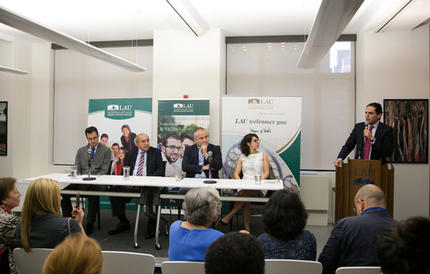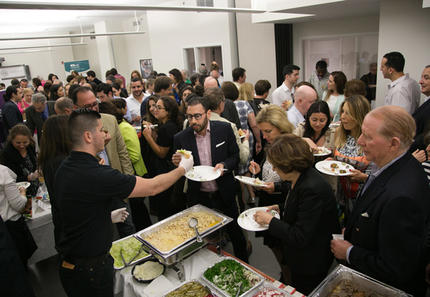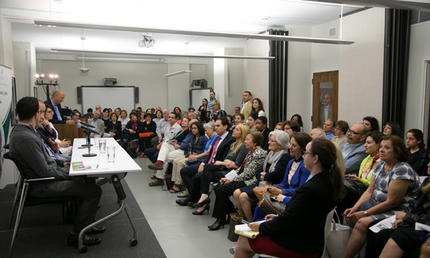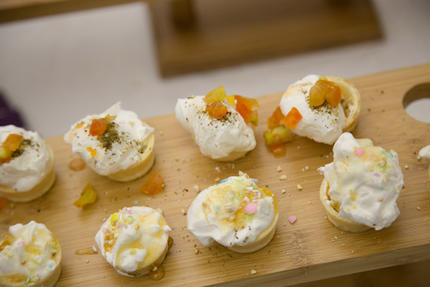Food is the great equalizer
Lebanese-American immigrants reveal the power of their culinary heritage at LAU New York Headquarters and Academic Center.

At the conclusion of the panel, Consul General Majdi Ramadan presented an award from Lebanese Minister of Foreign Affairs & Emigrants Gebran Bassil to chef Philippe Massed (second from right), honoring him for his inspiration to people of Lebanese heritage around the world.

Guests were invited to sample cuisine from Amir’s Grill, Byblos, Hayat Caterers Inc., Le Sajj, Manousheh, and Semsom, along with sweets from Les Cinq Amandes and Maha Chocolates.
For Lebanese-Americans the food of their ancestors has always been key to preserving their identity and perpetuating a culture that celebrates life and its joys.
“Food traditions are maintained over generations because they provide ethnic immigrant groups with a strong sense of attachment to their homeland,” declared the LAU New York Headquarters and Academic Center’s Academic Executive Director Lina Beydoun.
More than that, said Matthew Jaber Stiffler, research and content manager at the Arab American Museum in Michigan and a fourth-generation Lebanese-American, food becomes a way for immigrants to control the narrative.
“The turn of the century was a period of intense xenophobia and tremendous anti-immigrant sentiment,” he said to an audience of more than 150 people gathered at the LAU New York Headquarters and Academic Center earlier this month. The speaker explained that there was open discrimination against Syrian immigrants in New York—one public health official compared them to vermin and many called for a halt to all immigration from Syria. At the same time, restaurant critics from the New York Times praised the “exotic delicacies” at eateries in their neighborhood, nicknamed “Little Syria.”
“By the time it got to me, nobody spoke Arabic anymore, nobody was travelling back to Lebanon … what we had left was the food. That was my only connection to my Lebanese heritage,” said Stiffler, whose scholarly work on food and culture was spurred by this early interest.
In the 1980s, Philippe Massoud, now CEO and executive chef of the award-winning restaurant ilili, emigrated to the U.S. at a time when the Lebanese were occasionally portrayed in the American press as terrorists. “I came here a wounded bird from a land that was on fire … and I took every occasion to promote and defend my people,” he said adding that he hopes to continue to spread the gospel of Lebanese cuisine to Americans for a long time to come.
Walking in Massoud’s footsteps Manal Kahi, co-founder and CEO of Eat Offbeat, began her business out of a longing for her grandmother’s hummus. Not finding any that tasted quite right in New York grocery stores, she began experimenting with her own variations. Eventually this led her to team up with her brother Wissam in order to provide authentic foreign cuisine with a socially-responsible twist: Eat Offbeat only hires refugees as chefs.
“We advertise the idea of adventurous eating,” she said, adding that New Yorkers are not only hungry for new tastes but also for a different narrative around refugees and immigration.
For co-founders of the new fast-casual restaurant Semsom Eatery, sisters Carine Assouad and Christine Sfeir, Lebanese food has to do with their heritage too. “Choosing dishes for Semsom was a way of connecting to my history,” Sfeir said. “We have recipes that are very innovative, but you will also see recipes from my grandmother, my mom, and some of my own.”
The audience was able to sample everything from traditional manousheh and labneh to halawet el jibn. As the evening came to a close, Charlie Sahadi, owner of Sahadi’s Grocery in Brooklyn, spoke about his conviction that good food can help make the world a better place. “If they started peace talks with a good meal, the talks would go so much better … food is the great equalizer―it makes you not any better than me and me not any better than you.”
“Food and Identity: Celebrating Lebanese Cuisine in New York” was co-sponsored by LAU and the Consulate General of Lebanon in New York.
More
Latest Stories
- LAU Nursing Camp Opens Eyes, Hearts and Futures
- Meet Dr. Zeina Khouri-Stevens, Executive Vice President for Health Services
- LAU Family Medicine Graduates to Benefit from a Partnership With Nova Scotia
- AKSOB Assistant Professor Shares Her Vision for the Future of Learning
- LAU Simulation Models Celebrate 20 Years of Learning, Leadership and Service
- The School of Engineering Hosts the Lebanese Electromagnetics Day
- LAU Stands Out on the Sustainability Scores
- Michael Haddad Walks Again for Climate Change and Food Security



